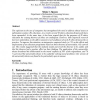Free Online Productivity Tools
i2Speak
i2Symbol
i2OCR
iTex2Img
iWeb2Print
iWeb2Shot
i2Type
iPdf2Split
iPdf2Merge
i2Bopomofo
i2Arabic
i2Style
i2Image
i2PDF
iLatex2Rtf
Sci2ools
ECIS
2003
2003
Universality thesis in IS ethics education - an empirical study
The explosion in the use of computers has strengthened the need to address ethical issues in information systems (IS) education. As a result, several IS ethics education frameworks have been expounded. At the same time, it has been argued that for the purposes of IS ethics education the existing theories of ethics are inadequate. However, little empirical research has been undertaken on the effects and perceived usefulness of such IS ethics frameworks in practice. To improve this situation, an interpretive empirical study (n=79) on the effects and implications of an education programme based on three theories of universality, was carried out. The results suggested that the students mostly perceived the theories to be useful, and that the theories had a positive effect on their thinking. The application of the universality theses broadened the deliberation on the moral conflicts of 58% of the respondents, and 76 % perceived the universality theses to be useful for solving moral problem...
ECIS 2003 | Ethics Education | Ethics Education Frameworks | Information Technology | Keywords IS Ethics |
Related Content
| Added | 31 Oct 2010 |
| Updated | 31 Oct 2010 |
| Type | Conference |
| Year | 2003 |
| Where | ECIS |
| Authors | Tero Vartiainen, Mikko T. Siponen |
Comments (0)

